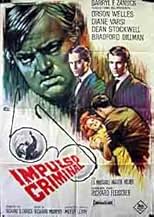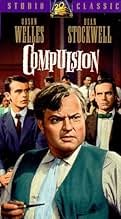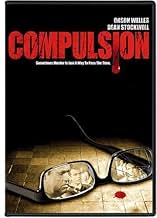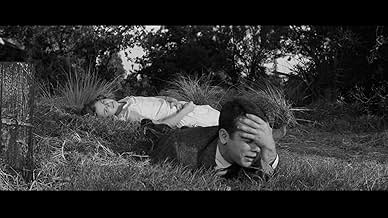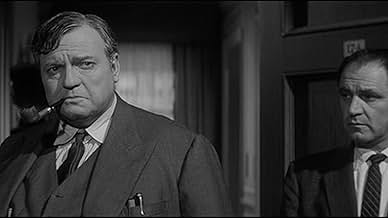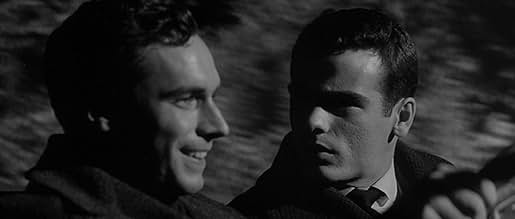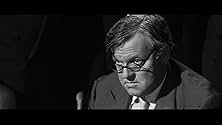VALUTAZIONE IMDb
7,4/10
8189
LA TUA VALUTAZIONE
In questa versione del caso Leopold-Loeb, due ricchi studenti di giurisprudenza vengono processati per omicidio.In questa versione del caso Leopold-Loeb, due ricchi studenti di giurisprudenza vengono processati per omicidio.In questa versione del caso Leopold-Loeb, due ricchi studenti di giurisprudenza vengono processati per omicidio.
- Regia
- Sceneggiatura
- Star
- Nominato ai 1 BAFTA Award
- 1 vittoria e 5 candidature totali
Robert F. Simon
- Police Lt. Johnson
- (as Robert Simon)
John Alban
- Reporter
- (non citato nei titoli originali)
Don Anderson
- Reporter
- (non citato nei titoli originali)
Brandon Beach
- Courtroom Spectator
- (non citato nei titoli originali)
Terry Becker
- Benson - The Angry Reporter
- (non citato nei titoli originali)
Russ Bender
- Edgar Llewellyn - Attorney
- (non citato nei titoli originali)
Recensioni in evidenza
I don't know why I'm so attracted to this vulnerable weirdos. From Anthony Perkins as Norman Bates in Psycho to Colin Firth as Adrian Leduc in Apartment Zero, darkness and a fragility that is part of the unbearable suspense. Maybe I'm in need of professional attention but I don't think so. What attracts me is by the undeniable innocence behind the horror and that has a lot, if not everything, to do with the actors playing them. Look at Anthony Perkins in Psycho! 57 years ago and it still looks and feels kind of revolutionary or Colin Firth in Apartment Zero, the character is so unique and real that you can see it a thousand times and always find some new extra something, then Dean Stockwell in Compulsion. He plays a monster, a sick, pathetic prince of a man. Yes all of that. The humanity of the actor makes the monster human and we can't dismiss him, he doesn't allow us. Orson Welles has a great entrance into the film and E.G Marshall is superb as per usual, it is the rest of the cast who seem a bit dated, specially when sharing the frame with the extraordinary Dean Stockwell
Watching this 1959 Richard Fleischer confirmed something I've always known. Dean Stockwell is a superb actor and an extraordinary presence on the screen. So, I think it's strange that he's not regarded as one of the greatest actors that ever lived. He started as a kid. He was Gregory Peck's son, twice. He was in musicals with Gene Kelly and Frank Sinatra. He was directed by Elia Kazan. He made allegorical movies like "The Boy With Green Hair" directed by black listed Joseph Losey. He was Edmond in "Long Day's Journey Into Night" sharing the screen with Katharine Hepburn, Ralph Richardson and Jason Robards. No to mention his work in "Sons and Lovers" or the movies with Wim Wenders and David Lynch. Here, in "Compulsion" his performance is worthy of an Oscar and in fact he go the accolades at the Cannes Film Festival sharing the acting honors with Orson Welles and Bradford Dillman. But, looking at it now he is the one that comes out as the one who passed in triumph the test of time. His performance is so rich so perfectly modulated that you go straight into the human center of his sick, appalling character. "Compulsion" deserves to be rediscovered and Dean Stockwell's performance should be the main reason.
The film deal with two young men (Bradford Dillman , Dean Stockwell) who murder a pal . They are law students and followers to Nietsche theories . They are investigated by an astute prosecutor (E.G.Marshall) . He's growing suspicion but there isn't one perfect crime . As the relentless justice to be executed and they go on trial for killing . A famous lawyer (Orson Welles) will defend them on the accusation of murderers and under death penalty . A young girl (Diane Varsi) will testify for them .
This highly interesting film is inspired on real events about Nathan Leopold-Richard Lob killing case in Chicago of the 1920s . Although the story was obviously a thinly-disguised recreation of the known murder case , the legal department of 20th Century Fox was still concerned about a possible lawsuit from the still-living Leopold . In fact , a great effort was made not to mention Leopold or Loeb in the film , press releases , and interviews . The film contains suspense , drama , tension , illicit love with intertwining triangles , emotion , courtroom trial and complex intrigue maintained throughout . Besides , superb performances by main roles (Dillman , Stockell , Varsi, Welles) and supporting casting (Martin Milner , Robert F. Simon , Gavin McLeod , among others). Special mention for Orson Welles who displays a terrific acting and explaining a significant speech into criminal court . The movie is visually magnificent with an excellent black and white cinematography by William C. Mellor . Evocative and adjusted music by Lionel Newman . The motion picture was wonderfully directed by Richard Fleischer .
This is the second of four film adaptations of the Leopold-Loeb murder case , other versions about same events are the famous ¨The rope¨ (1948) by Hithcock with John Dall (in the character of Bradford Dillman )and Farley Granger (in the role of Dean Stockwell), ¨Swoon¨ and recently ¨Murder by numbers¨ by Barbet Schroeder with Michael Pitt and Ryan Gosling . Indispensable and fundamental seeing for court genre enthusiasts and Orson Welles fans . It's one of Richard Fleisher's best. Rating : Above average .
This highly interesting film is inspired on real events about Nathan Leopold-Richard Lob killing case in Chicago of the 1920s . Although the story was obviously a thinly-disguised recreation of the known murder case , the legal department of 20th Century Fox was still concerned about a possible lawsuit from the still-living Leopold . In fact , a great effort was made not to mention Leopold or Loeb in the film , press releases , and interviews . The film contains suspense , drama , tension , illicit love with intertwining triangles , emotion , courtroom trial and complex intrigue maintained throughout . Besides , superb performances by main roles (Dillman , Stockell , Varsi, Welles) and supporting casting (Martin Milner , Robert F. Simon , Gavin McLeod , among others). Special mention for Orson Welles who displays a terrific acting and explaining a significant speech into criminal court . The movie is visually magnificent with an excellent black and white cinematography by William C. Mellor . Evocative and adjusted music by Lionel Newman . The motion picture was wonderfully directed by Richard Fleischer .
This is the second of four film adaptations of the Leopold-Loeb murder case , other versions about same events are the famous ¨The rope¨ (1948) by Hithcock with John Dall (in the character of Bradford Dillman )and Farley Granger (in the role of Dean Stockwell), ¨Swoon¨ and recently ¨Murder by numbers¨ by Barbet Schroeder with Michael Pitt and Ryan Gosling . Indispensable and fundamental seeing for court genre enthusiasts and Orson Welles fans . It's one of Richard Fleisher's best. Rating : Above average .
Leopold was paroled after years of being a model prisoner, planning all kinds of prison reforms, and when released did philanthropic work in Puerto Rico. Interesting that Meyer Levin, author of book on which this film is based said, this amazingly redeemed man just a few times gave Levin a chill as it became clear that this character of 'St. Leopold' was just another creation of a true psychopath. The mocking narcissistic smirk was still there under it all.
We can add Welles to Wilde, Monroe and others who we never respected until they were gone. His pleading for the lives of those crazy boys (as Clarence Darrow did) is an eloquent plea for the ending of the death penalty. Funny, how a barometer like the death penalty tells us so much about a society's relative civility. The US had backed away from it, but is now swinging back toward even public executions (which I would much prefer, as they show all of us how barbaric we have become).
Note that the movie dwells on their 'craziness' and 'richness', not the Jewishness or the homosexual relationships that evoked the wrath of the public in the real case. Both Dillman and Dean Stockwell do an excellent job of drawing out your anger until you find yourself one of the mob yelling for blood. To stem the tide, in comes Orson Welles. Welles' phrasing and meaningful looks struck me again with what a magnificent actor he was, as well as director.
Now I have to go read 'Compulsion', the novel around which this movie was made, to determine what was left out and if it would have contributed to some of the obviously omitted details that make this movie a little choppy. This movie performs the task that great art must take on itself: to provide us insights into life and how it should be lived. That can be done either negatively or positively, by point or counter-point.
Of course, unless you had some excellent writers and actors of the stature of Welles, you wouldn't come up to the quality of this movie. Definitely, black and white contributed to the brooding quality of the film. Color would have detracted, and you'll seldom 'hear' me say this.
Note that the movie dwells on their 'craziness' and 'richness', not the Jewishness or the homosexual relationships that evoked the wrath of the public in the real case. Both Dillman and Dean Stockwell do an excellent job of drawing out your anger until you find yourself one of the mob yelling for blood. To stem the tide, in comes Orson Welles. Welles' phrasing and meaningful looks struck me again with what a magnificent actor he was, as well as director.
Now I have to go read 'Compulsion', the novel around which this movie was made, to determine what was left out and if it would have contributed to some of the obviously omitted details that make this movie a little choppy. This movie performs the task that great art must take on itself: to provide us insights into life and how it should be lived. That can be done either negatively or positively, by point or counter-point.
Of course, unless you had some excellent writers and actors of the stature of Welles, you wouldn't come up to the quality of this movie. Definitely, black and white contributed to the brooding quality of the film. Color would have detracted, and you'll seldom 'hear' me say this.
Lo sapevi?
- QuizAlthough the story was a thinly-disguised recreation of the Nathan Leopold and Richard Loeb murder case, the legal department of 20th Century Fox was still concerned about a possible lawsuit from the still-living Leopold. A great effort was made not to mention Leopold or Loeb in the movie, press releases, and interviews. However, there was apparently poor communication with the advertising department, since when the movie came out, newspaper ads stated, "based on the famous Leopold and Loeb murder case." Leopold sued the filmmakers. He did not claim libel, slander, nor anything false nor defamatory about the film. Instead, he claimed an invasion of privacy. The court rejected his claim, in part, because Leopold had already published his own autobiography "Life Plus 99 Years," presenting essentially the same facts.
- BlooperWhen the murdered boy is in the morgue, his uncle recognizes him instantly, and the coroner doesn't mention to the young journalist (who found the glasses) that the kid had acid burned all over his face so he couldn't be identified. In the real life case, his face was burned and, most importantly, at the very end of the movie, Orson Welles as the defending attorney mentions that the murdered boy's face was burned with acid.
- Citazioni
Jonathan Wilk: If there is any way of destroying hatred and all that goes with it, it's not through evil and hatred and cruelty, but through charity, love, understanding.
- Curiosità sui creditiOpening credits prologue: CHICAGO, 1924
- ConnessioniFeatured in The Paper Chase: Commitments (1983)
I più visti
Accedi per valutare e creare un elenco di titoli salvati per ottenere consigli personalizzati
- How long is Compulsion?Powered by Alexa
- Is 'Compulsion' based on a book?
- How closely does this movie follow the real story about Leopold and Loeb?
- Who represents Leopold and who represents Loeb in the movie?
Dettagli
- Data di uscita
- Paese di origine
- Lingua
- Celebre anche come
- Compulsión
- Luoghi delle riprese
- Azienda produttrice
- Vedi altri crediti dell’azienda su IMDbPro
- Tempo di esecuzione1 ora 43 minuti
- Colore
- Proporzioni
- 2.35 : 1
Contribuisci a questa pagina
Suggerisci una modifica o aggiungi i contenuti mancanti

Divario superiore
By what name was Frenesia del delitto (1959) officially released in India in English?
Rispondi

